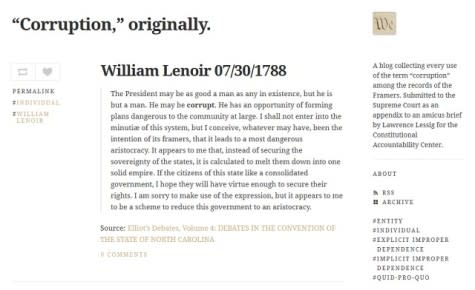Can Tumblr make a difference in the Supreme Court’s campaign financing case?
Could the online blogging site Tumblr play a key role in a widely followed Supreme Court case about campaign spending limits? That’s what one prominent professor is hoping.
Lawrence Lessig from Harvard is talking about his decision to include a Tumblr in an amicus brief he filed in the case of McCutcheon v. Federal Election Commission case, which the Court will hear on October 8.
Link: Read Professor Lessig’s brief
“At the center of the brief is a Tumblr—the first time a Tumblr has been used in an argument in a Supreme Court brief,” Lessig says on his blog, which is also hosted on Tumblr.
Lessig says the Tumblr blog submitted to the Court contains at least 325 references to the word “corruption” as used by the Founding Fathers.
“This research should be significant to the “originalists” on the Supreme Court (the 5 conservatives) at least,” Lessig hopes.
His argument is that the Founding Fathers were talking about “institutional corruption” when they wrote and talked about the concept. That idea, Lessig believes, supports the concept that large donations from corporations should be limited.
The Tumblr blog lists quotes from everyone from George Mason to Alexander Hamilton on the subject.
The brief has already likely been analyzed by clerks at the Supreme Court, which is a good thing, since they’ll also likely need to explain Tumblr to the justices.
In August, Justice Elena Kagan said in an interview in Rhode Island that most of the justices depend on the much-younger clerks to explain the technology behind Facebook, Twitter, and other services to them.
“The justices are not necessarily the most technologically sophisticated people,” she said when asked about NSA surveillance policies. “The court hasn’t really ‘gotten to’ email.”
In fact, the justices still communicate using printed notes that are hand delivered by aides.
The Court’s ability to comprehend new technology and platforms has been questioned in recent years.
Judge Richard Posner asks the question in his book, Reflections on Judging, and doesn’t limit it to the Supreme Court.
“Federal judges on the whole are not well adapted by training and experience to the technological age we live in,” he says.
He also cites a Case Western Reserve Law Review article by Mark Grabowksi at Adelphi University that lists technological flubs by the Court.
But Tumblr, with its very simple layout and presentation, shouldn’t pose an issue. After all, a clerk could just print out a collection of the 325 quotes on corruption, on court-approved paper from the 19th century.
Lessig also added a catalog and analysis of his Tumblr blog, in his brief, to make his point in great detail.
“Of 325 recorded usages, 56% (183) referred to corruption of an entity, while 44% (142) spoke of corruption of an individual,” he says in the brief.
The list also breaks down the quotes by the names of the Founding Fathers, allowing a resourceful researcher to decide if the number of quotes, say, from Alexander Hamilton or John Jay, have more weight than those from Elbridge Gerry or Patrick Henry.
That is most likely a question for another day and another Tumblr blog.
Scott Bomboy is the editor-in-chief of the National Constitution Center.
Recent Constitution Daily Stories
The FISA court’s one-sided opinion upholding NSA surveillance
What if Congress doesn’t increase the debt limit? The risks of default


